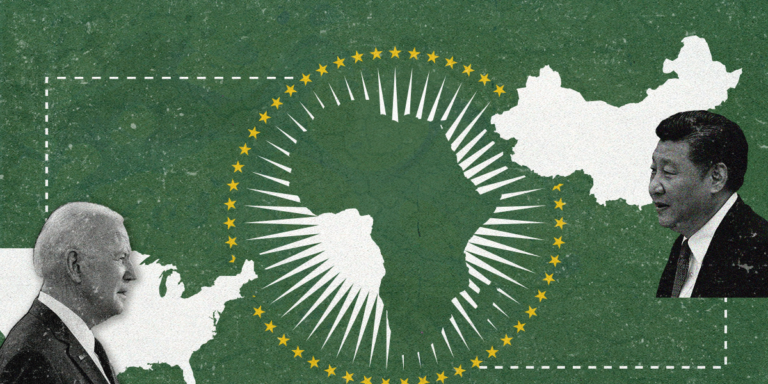Heads of state and/or government from 49 African countries are currently breaking bread at the US-Africa Leaders Summit at the White House. It’s only the second such summit in history, the last one hosted by President Obama in 2014.
It’s no secret that many African nations have long felt jilted by Uncle Sam. But the Biden administration is trying to cast the conference as a reset in US relations with the world’s fastest-growing continent, announcing a $55 billion investment in Africa over the next three years and a presidential visit next year.
Still, some African experts are skeptical that Washington’s approach to Africa is really changing. To them, it can often seem that Washington is more focused on keeping Beijing – which in recent yeast has outpaced the US in foreign direct investment to Africa – away from the continent than on creating new opportunities for growth independent of China’s activities there.
To make sense of the Biden administration’s Africa policy, we had a chat with Amaka Anku, Eurasia Group’s lead Africa analyst.
GZERO: A White House official said this week that the US is “the partner of choice” for African states – which was broadly considered to be a dig at China. How is this sort of thing perceived by African leaders?
I don’t think it’s particularly controversial. I mean, he’s a US official – what else is he going to say?
What’s more controversial is when they go after China directly and say “the Chinese are using a ‘debt trap’” – rhetoric that we saw from former President Trump. A lot of African policy makers really chafed at that. It was very paternalistic. It was very much like “hey, you guys, you must be so stupid” for entering into this sort of arrangement with the Chinese.
Biden hasn’t really done that. His rhetoric has been all great and pretty, but it’s … hollow. So the problem isn’t really what they’re saying. It’s what they’re not doing. The Biden administration is saying all the right things but they’re not really doing things differently.
Ok, so what are Africa’s biggest investment needs right now?
Infrastructure in all of its forms. China has put a lot of money into transport infrastructure – roads and rails – which has been very helpful in terms of connectivity and economic growth.
Why isn’t the US government giving more money to Africa then?
Well, it’s not important enough. It’s just not a priority. And that’s why a lot of the rhetoric sounds hollow.
But it’s not just about the government, because there are two levels to this relationship. There’s the government – and China has done well on this front – but it’s also about relationships in the private sector, and the US is substantially a private sector led economy. If the American private sector doesn’t see Africa in terms of economic opportunity then it’s not going to put its money there.
Has Biden’s approach to engaging Africa differed from his predecessors?
Every time the US wants to talk about Africa they always start with value promotion. It’s always about open and liberal societies. But this misses the point. The biggest constraint on mature, competitive, electoral party politics across Africa today is lack of state capacity and low economic outcomes.
So if you look at Biden’s sub-Saharan Africa strategy, the first points are about “open and liberal societies,” and “democratic governance” – and then eventually you get to post-pandemic development. That’s where you should start!
Government officials like to bring up “democratic backsliding” because there was a coup in places like Mali or Burkina Faso. But those coups happened because those states could not guarantee security for their citizens. It’s not because people want authoritarianism.
What has China’s Africa policy been like?
China doesn’t do value promotion. China will come to an African state and say “what do you want?” and then will help them finance it. There are also problems with this approach.
Do African governments feel that they are being used as pawns in the greater China-US rivalry?
African countries don’t feel like Washington is generally interested in the region beyond its China strategy. Biden is trying to pivot away from that, saying his strategy is solely about the relationship with Africa. But there’s still a broad feeling that the US only cares about projecting its values and influence.
To be fair, every country’s foreign policy is about projecting values and interests, but it’s about how you do it. And the question for Biden is: Do you think African economic transformation supports that goal or is it just about getting ahead in your battle with China by having new export markets in Africa? Do your interests align with ours or is it just about countering Chinese influence?
So you still think it’s the latter?
Yeah, right now it still feels rhetorical. I think they have a lot of work to do to show if it’s not.



